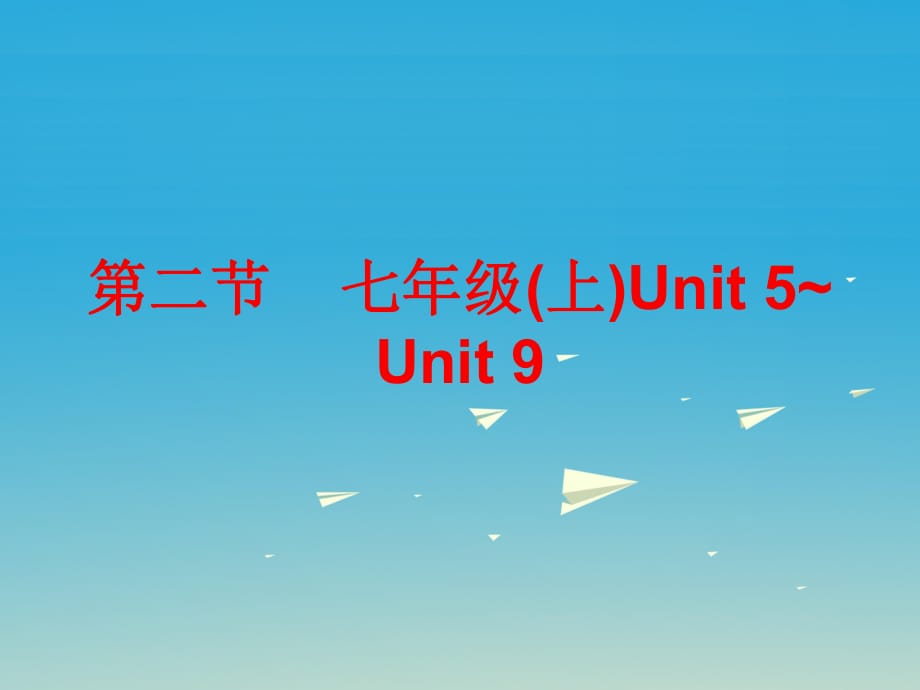《中考英語(yǔ)總復(fù)習(xí) 第五部分 教材梳理 第二節(jié) 七上 Unit 5-9課件》由會(huì)員分享�,可在線(xiàn)閱讀��,更多相關(guān)《中考英語(yǔ)總復(fù)習(xí) 第五部分 教材梳理 第二節(jié) 七上 Unit 5-9課件(22頁(yè)珍藏版)》請(qǐng)?jiān)谘b配圖網(wǎng)上搜索。
1��、第二節(jié) 七年級(jí)(上)Unit 5Unit 9 考 點(diǎn) 聚 焦【考點(diǎn)1】Do you have a soccer ball����?你有一個(gè)足球嗎���?【解析】該句型用以詢(xún)問(wèn)某人有沒(méi)有某物。Do / Does have?意為“有嗎�����?”句中的do / does是助動(dòng)詞,幫助構(gòu)成一般現(xiàn)在時(shí)����,此時(shí)沒(méi)有實(shí)際意義��。have意為“有”��,第三人稱(chēng)單數(shù)形式為has��。have還可以表示“從事�����;進(jìn)行�;吃��;喝��;渡過(guò)”等意思。 【演練】( )1. Do you have a telephone? _. And its red. A. Yes���,I am B. Yes, I did C. Yes,I do D. Yes, I does
2�、C ( )2. We are too tired. Lets stop _ a rest. A. to have B. have C. having D. has( )3. Daniel�����,_ play with the mobile phone while youre walking in the street. A. dont B. doesnt C. wont D. cantAA ( )4. Brian and Russ _ a great time at your party last night. A. have B. has C. to have D. hadD 【考點(diǎn)2】Lets
3、think about the food. 讓我們考慮一下食物吧��?�!窘馕觥吭摼湫陀靡员磉_(dá)建議��。這是個(gè)以使役動(dòng)詞let開(kāi)頭的祈使句。常用來(lái)提出建議�����,常用OK./ All right./ Good idea./ That sounds good. 等作答表贊成����;若表示不贊成�,則用Sorry���,I等作答。let sb. do sth.意 為“讓某人做某事”��,表否定時(shí)用let sb. not do sth.。以L(fǎng)ets開(kāi)頭的祈使句���,其反意疑問(wèn)句的附加部分用shall we��;以L(fǎng)et us開(kāi)頭則用will you���。think about意為“考慮”,后面常接名詞�、動(dòng)名詞或帶疑問(wèn)詞的不定式��。 【演練】( )
4���、1. Lets _ and help him. A. go B. going C. to go D. goes( )2. Lets go out for a picnic on Sunday. _. A. Good idea B. Here you are C. Nice to meet you D. Dont worry about itAA ( )3. She always _ others more than herself. A. thinks B. thinks up C. thinks about D. thinks hardC ( )4. Lets go to school on
5��、 foot�,_��?A. will you B. do you C. dont we D. shall we( )5. Im thinking about _ the fridge, the washing machine and even the micro oven before moving. A. to sell B. sell C. selling D. sellerDC 【考點(diǎn)3】Why does Bob like history? 鮑勃為什么喜歡歷史?Because its interesting. 因?yàn)樗苡腥?���。【解析】該句型用以?xún)問(wèn)��、闡述原因。Why意為“為什么”�����,是疑問(wèn)副詞����,用
6�����、來(lái)提問(wèn)原因,常常用because引導(dǎo)的句子來(lái)回答����。because與so在一個(gè)句子中不能同時(shí)出現(xiàn)�。 【演練】( )1. _ do you like ping-pong? Because it is relaxing. A. How B. When C. Why D. WhereC ( )2. We didnt enjoy the day _ the weather was too bad. A. because B. though C. unless D. tillA ( )3. It might be a boys room _ the clothes look like boys cloth
7�、es. A. when B. because C. but D. so( )4. _ I am very busy,_ I cant go out with you. A. Because; so B./ ; so C. So;/ C. So; becauseBB 【考點(diǎn)4】How much are these socks?這些襪子多少錢(qián)�����?【解析】該句型用以詢(xún)問(wèn)價(jià)格�����?��!癏ow much+is / are+主語(yǔ)�?”意為“多少錢(qián)��?”相當(dāng)于“Whats the price of����?” How much+不可數(shù)名詞���,可詢(xún)問(wèn)數(shù)量����,表“多少”�����。若詢(xún)問(wèn)可數(shù)名詞數(shù)量則用how many。 【演練】( )1. _
8��、 people are there in your family? Three. A. How often B. How long C. How many D. How muchC ( )2. _ pocket money do you usually get every month? Fifty yuan. What about you?A. How often B. How long C. How many D. How muchD ( )3. _ is the English dictionary? 40 yuan. A. How much B. How old C. How many
9、D. How soon( )4. How much _ the milk? 4 dollars. A. are B. is C. am D. beAB 【考點(diǎn)5】My birthday is on May 2nd. 我的生日在五月二號(hào)��?!窘馕觥縪n+具體的一天或具體一天的上午���、下午��、晚上�����;in+一段時(shí)間(如年�、季���、月等)或不具體的上午�、 下午���、晚上�;at+鐘點(diǎn)時(shí)刻。 【演練】( )1. Do you know Victory Day in China?Yes��,its _ September 3rd _ each year. It tells the world that Chinese peo
10、ple love peace and hate wars. Chinese people will never forget the history. A. in�����;on B. on���;/ C. at;/ D. on����;inB ( )2. When did you see Jimmy again after that? _ a sunny afternoon in June, last year. A. On B. At C. In D./ ( )3. On weekends�,I usually go to bed late and get up at 10_ the morning. A. in B. at C. on D. forAA ( )4. What activities do you have _ April?A. in B. on C. of D. at( )5. Lets meet _ 10:30 next Tuesday afternoon. A. for B. on C. at D. inAC
 中考英語(yǔ)總復(fù)習(xí) 第五部分 教材梳理 第二節(jié) 七上 Unit 5-9課件
中考英語(yǔ)總復(fù)習(xí) 第五部分 教材梳理 第二節(jié) 七上 Unit 5-9課件

